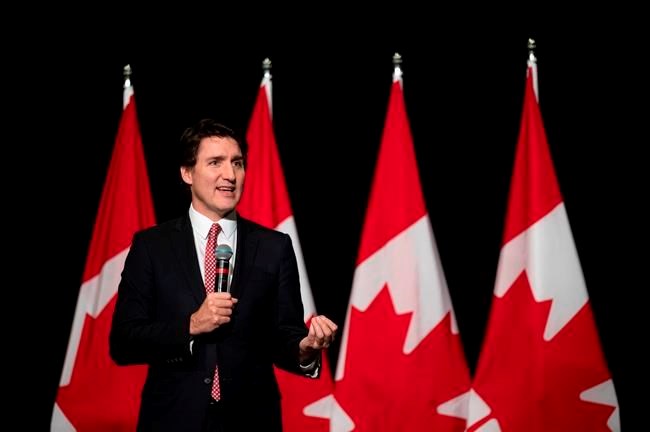OTTAWA — Canada's foreign affairs minister says there is a high legal threshold for proving claims of genocide, though the Liberal government isn't taking a clear position for or against South Africa's case against Israel at the top United Nations court.
"We will follow the proceedings of South Africa's case at the International Court of Justice very closely," Joly wrote in a statement released Friday, which came days after peer countries weighed in on the case in more definitive terms.
South Africa's lawyers argued in the court Thursday that Israel's bombardment of the Gaza Strip, and its siege on the Palestinians who live in the territory, "are genocidal in character."
Israel, a Jewish state founded in the aftermath of the Holocaust, has vehemently denied the allegations. Israel took the rare step of engaging with the court, which is based in The Hague, to defend its international reputation.
Prime Minister Justin Trudeau told reporters on Friday that South Africa might not have met the bar for establishing that a genocide is taking place.
Neither Trudeau nor Joly were specific about what Canada would do if the International Court of Justice were to rule in favour of South Africa's claims.
"Canada is engaged in five cases at the ICJ because we believe in the importance of that as an institution," Trudeau said during a news conference in Guelph, Ont.
"But our wholehearted support of the ICJ and its processes does not mean that we support the premise of the case brought forward by South Africa."
In a statement following Trudeau's remarks, Joly noted that the 1948 Genocide Convention defines the crime as intending to destroy a group in whole or in part, because of their nationality, ethnicity, race or religion.
"Meeting this high threshold requires compelling evidence," she wrote.
She also warned the case could provoke hate crimes.
"We must ensure that the procedural steps in this case are not used to foster antisemitism and targeting of Jewish neighbourhoods, businesses, and individuals," she wrote. "At the same time, we will continue to stand against Islamophobia and anti-Arab sentiment."
South Africa has asked the international court to order Israel to halt its attacks, which began after Hamas militants killed 1,200 people in Israel on Oct. 7, including hundreds of civilians. About 240 others, including some children, were taken hostage.
Israel responded with airstrikes and by restricting access to crucial supplies in the Hamas-controlled territory, where local authorities say more than 23,200 Palestinians have been killed. A weeklong ceasefire in November led to 100 hostages being released to Israel.
Canada has repeatedly said international law must be followed by all parties in the Middle East, and Joly said a month ago she would support "any form of accountability systems" to determine whether Israel had violated global rules.
Mark Kersten, a criminology professor at the University of the Fraser Valley, said the government is using "waffling language" to not take a stance on the case that could further divide the Liberal caucus and the Canadian electorate.
"It's the classic Liberal government statement, which has in a sense something for everyone but not everything for everyone," he said.
He was relieved Ottawa did not follow the U.S., which deemed the case to be "unfounded" and "meritless" before hearings got underway on Thursday, and he was glad Ottawa didn't challenge the court's jurisdiction.
"It's far more measured," said Kersten, who researches international tribunals. "This could have been, in my opinion, a lot worse."
Germany came out against South Africa's case on Friday, saying there is "no basis whatsoever" for an accusation of genocide against Israel.
Some advocacy organizations interpreted the Liberals' statements as rejecting South Africa's case.
The National Council of Canadian Muslims said it was "beyond disappointed" with Trudeau's response, arguing it fell short of supporting the principles of humanitarianism and accountability.
"This signals a failure to support Canada's commitment to international law."
The Centre for Israel and Jewish Affairs said it was glad to see Trudeau's initial statement, but had hoped Joly would have clearly rejected "the libellous genocide allegations against Israel."
Ahead of Trudeau's Friday news conference, Conservative Leader Pierre Poilievre accused the prime minister of playing to both sides of the issue.
"He is telling whatever you want to hear, and then he is going to another group and saying exactly the opposite," Poilievre told reporters Friday in Winnipeg.
The Conservatives oppose the case, which Poilievre said is "shamelessly and dishonestly attacking the Jewish people and the Jewish state."
The Conservatives did not provide additional comment after Trudeau and Joly weighed in.
The federal New Democrats had urged Canada to not intervene in opposition to the case, and to echo France in saying it would support whatever verdict the court makes.
Members of Trudeau's Liberal caucus have expressed a range of opinions on the issue, with some siding with South Africa and others with Israel.
On Friday, Montreal MP Anthony Housefather thanked Trudeau for his stance, noting both he and Toronto MP Marco Mendicino — who was formerly the minister of public safety — have said "the claim that Israel is committing genocide is baseless and unconscionable."
"Very pleased that Prime Minister Trudeau has made clear that Canada does not support the premise of South Africa’s claim at the ICJ," Housefather wrote.
Kersten said he's relieved Canada has not challenged the court itself, or suggested it would ignore a ruling, as both could delegitimize an institution it is looking to in the fight for justice in Syria and Myanmar.
"It would have undermined Canada's standing or its reputation, when it comes to supposedly being a beacon of this international rules-based order," he said.
This report by The Canadian Press was first published Jan. 12, 2024.
— With files from The Associated Press
Mickey Djuric and Dylan Robertson, The Canadian Press

